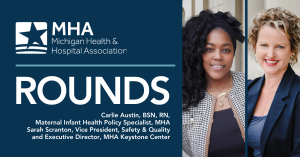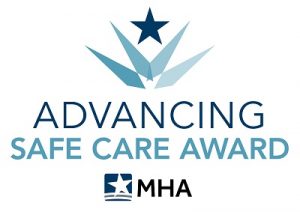
 In observance of Black Maternal Health Week this April 11-17, Carlie Austin, maternal infant health policy specialist, MHA, and Sarah Scranton, vice president, safety & quality and executive director, MHA Keystone Center, share the importance of addressing disparities in maternal care and actions to reduce them.
In observance of Black Maternal Health Week this April 11-17, Carlie Austin, maternal infant health policy specialist, MHA, and Sarah Scranton, vice president, safety & quality and executive director, MHA Keystone Center, share the importance of addressing disparities in maternal care and actions to reduce them.
- Conversations about disparities in care are difficult and nuanced. How can hospitals and health systems facilitate productive conversations about the disparities that exist in maternal healthcare?
Carlie: Culture shifts must occur at the societal, system and interpersonal level to enact meaningful change. Healthcare needs to adopt a transparency-first culture where acknowledging our challenges is not only accepted, but encouraged. We cannot address systemic imbalances without first acknowledging our roles and limitations. Michigan hospitals and health systems are responsible for creating cultures in which their staff, partners and patients feel safe to provide constructive feedback. While it is important for our hospitals and systems to create space for transparent discussions, they also deserve the same from society. For hospitals and health systems to candidly acknowledge their roles and limitations, they must feel safe. Therefore, assessing and addressing the reasons why systems feel unsafe in their abilities to do so is a vital aspect of the conversation that largely goes unheard.
Sarah: To Carlie’s point, culture plays a pivotal role in health outcomes. Quality care cannot exist without equitable care. While we have made great strides toward celebrating staff who speak up to prevent harm to patients and staff, we must also welcome dialogue that extends beyond specific cases. Data shows that racial disparities in care are systemic, so we must be willing to examine all aspects of our systems and processes that may impact patient care.
- As anchor institutions in their communities, how can hospitals and health systems foster cross-sector collaboration that addresses systemic issues like maternal health disparities?
Sarah: Hospitals and health systems are uniquely positioned to improve health, but many other organizations play a critical role in the wellbeing of communities. While acute care has been the primary focus of health equity efforts, social determinants of health must also be recognized. Hospitals invest heavily in their communities, forging strong relationships with nonprofit organizations, local businesses and policymakers. An unwavering commitment to collaboration is essential to eliminate systemic challenges.
Carlie: Effective collaborations start with how you view the problem. Hospitals take meaningful action to improve the quality of care during delivery and the immediate days after. However, we know the health of birthing people is not determined at the point of labor and delivery. There remains a substantial gap in improving preconception health and postpartum health. Birthing people are impacted by a plethora of factors external to the hospital or health system’s direct control; however, it is essential that everyone broadens their belief about their responsibility of the problem and their ability to reduce disparities beyond their historical purview. It must be a collective effort with a shared accountability across the continuum if we want to ensure population-level change.
- What are some immediate actions Michigan hospitals and health systems can take to improve care for Black birthing people?
Carlie: Examine the audiences we are engaging to address disparities in care. While messaging toward decision-makers and hospital leaders is immensely valuable, we must recognize that it is our responsibility to deliver our messages and broaden our conversations to include those we aim to reach or represent. I love the saying, “nothing about us, without us”. Adopting that message in this context means hospitals and health systems should evaluate their engagement with those they are making decisions about and ensure they are intentionally including those of interest in the decision-making process. This will lead to a more robust and tailored approach to addressing pervasive healthcare disparities.
Sarah: Collaboration is one of the most valuable aspects of improving care. The MHA Keystone Center recommends members prioritize the following collaborative initiatives and events this year to supplement existing efforts to reduce disparities in maternal healthcare.
- Attend the Michigan Maternal Infant Health Summit, June 17-18.
- Sign up for the Joint Commission’s MLC Verification program.
- Participate in the Regional Perinatal Quality Collaborative.
- Attend Regional Maternal Health Workshops in West Michigan May 16.
- Join the Michigan Alliance for Innovation on Maternal Health.
Members with questions may contact the MHA Keystone Center.


